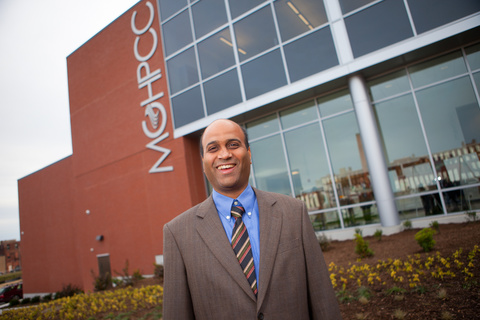Net Zero Data Center a Tool for Testing Sustainability

Some computer data centers see electricity bills in the millions of dollars each month, and costs continue to rise, said CICS Professor Prashant Shenoy, which is why the official opening in February of New England's first experimental solar-powered data center located at the Massachusetts Green High Performance Computing Center (MGHPCC) in Holyoke was recently hailed as a promising first step in leading the nation toward net-zero, green data and computing centers.
The 200-square-foot Mass Net Zero Data Center (MassNZ) is a shed-sized micro data center on the MGHPCC grounds. Using MassNZ for testing, Shenoy will lead a team of investigators in researching how to power data centers sustainably with renewable energy.
Solar panels next to the facility provide power to run about three racks of a total of 40 servers, with cooling systems, batteries, and micro-flywheels for energy storage, Shenoy noted. MassNZ will also house a variety of different server, storage, sensor, and network systems.
His colleague, David Irwin, electrical and computer engineering professor, said, "We are the first in New England and one of the first in the nation to be doing this research, and ours is certainly the only one of these facilities that is next-door to a real data center, so we can benefit from comparing our experimental scenarios with what it is doing in real time. The combination is unique."
Among scenarios the researchers plan to simulate are cooling with air conditioning vs. outside air, converting from solar DC to grid AC power, and using power from several different storage battery types. They are collaborating with HG&E to deploy these. One of the first tasks for the team will be to create software for managing experiments remotely from campus. Once fully operational, MassNZ will be available to UMass and other MGHPCC university researchers for conducting experiments. It is supported in part by grants from the National Science Foundation, the American Public Power Association, and the Massachusetts Clean Energy Center.